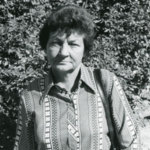Interviewer: Jennifer Lee
Interview Date: September 28, 1979
Location: Peavy Hall, Oregon State University
Duration: 1:33:35
In this interview, Margaret Milliken recount her early years, noting that her father was a grocer and that her maternal grandfather established the first grocery store in Oregon City during the early period of white settlement along the Willamette River. Growing up during the Depression, Milliken felt very fortunate to have had a family that was able to stay afloat because of their grocery business. During this time, she learned to play the violin and participated in many athletic activities with other kids her age.
Milliken then discusses her passion for teaching, which started when she was young. After attending Linfield College for two years, Milliken transferred to Oregon State College to take classes in their physical education program; she graduated in 1942. In recalling this time, Milliken describes the classes that she took and contrasts the degree to which contemporary athletes—both men and women—endure much more stress and pressure when compared to when she was in school. Milliken then mentions that she did not marry or have children.
From there, Milliken talks about how OSC became a mostly female institution after the Second World War broke out. She recalls that she was on a train when Pearl Harbor was attacked and that everyone on campus immediately began to feel insecure. She says many of her male colleagues were not sure about the potential for being drafted but that many joined the ROTC so they could enter the war as an officer rather than an enlisted man. Milliken also mentions that her brother was killed in an air battle in 1944 in Honolulu. She then talks about the direct impact that the war made on the Physical Education department. The interview concludes with Milliken noting how she had thirteen job openings as a P.E. teacher after she graduated from Oregon State.
Dublin Core
Title
Description
Milliken then discusses her passion for teaching, which started when she was young. After attending Linfield College for two years, Milliken transferred to Oregon State College to take classes in their physical education program; she graduated in 1942. In recalling this time, Milliken describes the classes that she took and contrasts the degree to which contemporary athletes—both men and women—endure much more stress and pressure when compared to when she was in school. Milliken then mentions that she did not marry or have children.
From there, Milliken talks about how OSC became a mostly female institution after the Second World War broke out. She recalls that she was on a train when Pearl Harbor was attacked and that everyone on campus immediately began to feel insecure. She says many of her male colleagues were not sure about the potential for being drafted but that many joined the ROTC so they could enter the war as an officer rather than an enlisted man. Milliken also mentions that her brother was killed in an air battle in 1944 in Honolulu. She then talks about the direct impact that the war made on the Physical Education department. The interview concludes with Milliken noting how she had thirteen job openings as a P.E. teacher after she graduated from Oregon State.

